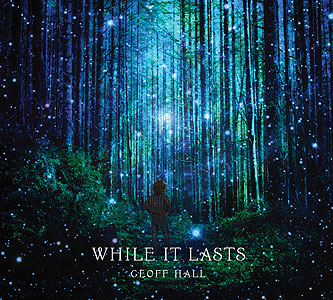 Back
in 2016, multi-instrumentalist Geoff Hall released Understanding
The Signs and in 2019 he returns on record with While It
Lasts. Geoff’s earlier release had no guitar on
it, instead that album featured a mix of orchestral sounding keyboard
music. In a musical twist of fate, Geoff gets back to his guitar roots
on While It Lasts. The nine-track, 36-minute album features
Geoff’s acoustic guitar front and center with added winds, strings,
piano and brass backing tracks. While It Lasts has a clear
influence from the Windham Hill sound of the late 1980s and 1990s,
especially influences from iconic acoustic guitarists such as Michael
Hedges, Alex de Grassi and Franco Morone. Although Geoff is well versed
in electric guitar styles too, with its focus on alternate tunings,
While It Lasts is an appealing sounding album of mesmerizing,
acoustic-based guitar sounds and styles. The strings enhance the sound
too, especially on track 3, “Resolved”, and another album
highlight called “Pheidippides”, with its haunting mellotron
brass sounds. Filled with scenic and pastoral vibes, While It Lasts
also underscores Geoff’s keen interest in film scores. Mastering
engineer David Glaser who worked on Understanding The Signs,
also gives While
It Lasts
a worthy CD sound. A standout release in a vast field of gifted guitar
players making fine albums, While It Lasts is a most enjoyable
album by a well-rounded guitarist and composer bringing his own unique
sonic vision to the wide world of music. www.GeoffHallComposer.com
Back
in 2016, multi-instrumentalist Geoff Hall released Understanding
The Signs and in 2019 he returns on record with While It
Lasts. Geoff’s earlier release had no guitar on
it, instead that album featured a mix of orchestral sounding keyboard
music. In a musical twist of fate, Geoff gets back to his guitar roots
on While It Lasts. The nine-track, 36-minute album features
Geoff’s acoustic guitar front and center with added winds, strings,
piano and brass backing tracks. While It Lasts has a clear
influence from the Windham Hill sound of the late 1980s and 1990s,
especially influences from iconic acoustic guitarists such as Michael
Hedges, Alex de Grassi and Franco Morone. Although Geoff is well versed
in electric guitar styles too, with its focus on alternate tunings,
While It Lasts is an appealing sounding album of mesmerizing,
acoustic-based guitar sounds and styles. The strings enhance the sound
too, especially on track 3, “Resolved”, and another album
highlight called “Pheidippides”, with its haunting mellotron
brass sounds. Filled with scenic and pastoral vibes, While It Lasts
also underscores Geoff’s keen interest in film scores. Mastering
engineer David Glaser who worked on Understanding The Signs,
also gives While
It Lasts
a worthy CD sound. A standout release in a vast field of gifted guitar
players making fine albums, While It Lasts is a most enjoyable
album by a well-rounded guitarist and composer bringing his own unique
sonic vision to the wide world of music. www.GeoffHallComposer.com
mwe3.com presents an interview with
GEOFF HALL
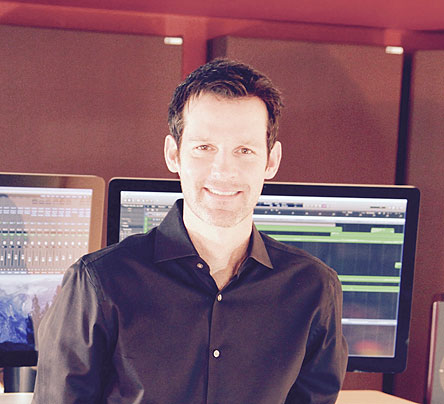 mwe3:
After your first solo album, Understanding The Signs came out
in 2016 you were already talking about recording your first solo guitar
album. What kind of statement were you trying to make with the 2019
CD release of While It and can you connect the two albums,
at least from a composer’s point of view? Were the tracks written
on guitar or keyboard? There's some great synth-sounding keyboards
for the backing tracks and string arrangements on the new album.
mwe3:
After your first solo album, Understanding The Signs came out
in 2016 you were already talking about recording your first solo guitar
album. What kind of statement were you trying to make with the 2019
CD release of While It and can you connect the two albums,
at least from a composer’s point of view? Were the tracks written
on guitar or keyboard? There's some great synth-sounding keyboards
for the backing tracks and string arrangements on the new album.
Geoff Hall: I love the piano and would like to be able to play
well, but so far it’s been an issue of how many hours are in
a day. My primary instrument is guitar, and all of these pieces were
composed on the guitar. I’ve had some of them lying around for
a while, and a few were written in the last few months. They were
all originally written as solo pieces.
All of the arrangements with the other acoustic instruments were put
together as part of this project. There are a lot of fantastic solo
guitarists out there, so I decided to make these pieces multi-instrumented
to add some other dynamics and emotional components. If there’s
a link between the two releases, it’s probably that - the effort
to put a certain emotional aspect to the piece. The first release
was closer to “film score” material, which I love, and the
intent with this one was to put my primary instrument forward but
layer it with other acoustic instruments to achieve something more
than another solo guitar release. I actually didn’t use any synths
on While It Lasts. All of the other instrumentation is acoustic:
strings, English horns, piano, solo violin, and some others.
mwe3: The title While It Lasts has many different meanings
you could read into it. There was a great story behind choosing the
title of Understanding The Signs so how about the While
It Lasts album?
Geoff Hall: I’m a fan of creating a ‘direction’
with a title and letting the listener apply it in a way that fits
for them. I try to do that with release titles and the titles of individual
pieces. Like the previous release, there are some deliberate connections
between the cover art, the release title, and the individual pieces.
As is the case with most of what I write, they’re personal for
me. There’s a specific story or event with each one. But, my
goal is to create something that everyone else can enjoy in their
own way. In this case, I worked with two artists on the cover: An
artist in Greece named Haroulita and a graphic designer, Mara Davis.
You’ll notice the boy isn’t on the back of the cover. In
addition, all of the pieces represent a moment or event in time...
Something that was fleeting or couldn’t last - even if you wanted
it to. I’ll leave it at that, and give you the freedom to hear
it in a way that’s meaningful for you.
mwe3: You started as a rock guitarist but there is no electric
guitar on While It Lasts. You mentioned some of the electric
guitars you have in your collection so how about the acoustic guitars
on While It Lasts, and did you feature a range of different
guitars on the new album and was there a specific go-to acoustic guitar
on the While It Lasts recordings?
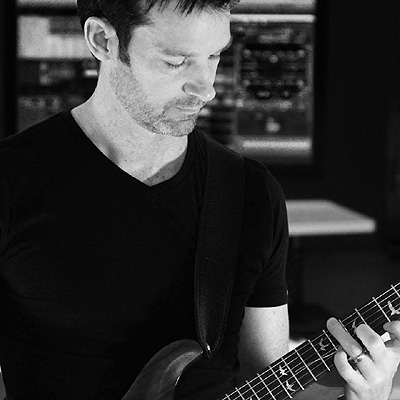 Geoff
Hall: Funny you should mention that. I’m hoping to have a
short (EP) release out before the end of the year that will probably
feature three to four pieces that are electric guitar and synth or
electric and acoustic or possibly even electric guitar and a combination
of hybrid instrumentation. I’ve got two of them finished, and
I’m working on the third piece now. On a brief tangent: I’m
not sure how they’ll be categorized or released. “New Age”
seems to be the catch-all for everything not Rock, Pop, Country, or
R&B. So, it will be interesting to see how it “gets out there,”
but I’m very pleased with the results so far and eager to get
it released. Back to the drawing board on the art...
Geoff
Hall: Funny you should mention that. I’m hoping to have a
short (EP) release out before the end of the year that will probably
feature three to four pieces that are electric guitar and synth or
electric and acoustic or possibly even electric guitar and a combination
of hybrid instrumentation. I’ve got two of them finished, and
I’m working on the third piece now. On a brief tangent: I’m
not sure how they’ll be categorized or released. “New Age”
seems to be the catch-all for everything not Rock, Pop, Country, or
R&B. So, it will be interesting to see how it “gets out there,”
but I’m very pleased with the results so far and eager to get
it released. Back to the drawing board on the art...
I’ve been lucky/fortunate to grab some great guitars along the
way. My wife has instituted some new “rules” that have forced
some trade-outs in recent years, but it’s probably for the best.
It’s helped to “thin the herd” and crystalize the focus
on the “keepers.” Truthfully, I am grateful to still have
a number of great instruments in the studio. While It Lasts
was recorded on several different instruments: a Ryan Mission, a Maingard
12 fret, a Ryan Nightingale, a Taylor dreadnought, and a Jim Redgate
classical.
mwe3: Did your early interest in the Windham Hill sound influence
your writing and recording approach on While It Last? You have
said that the sound of your influences from Will Ackerman and Alex
De Grassi wasn’t New Age per se but was a kind of acoustic Americana
sound you were after on the new album? Does the keyboard side of New
Age lend itself to a more synth-based sound whereas guitarists, especially
acoustic guitarists, have to work much harder to achieve the kind
of sonic New Age ambience you create on the new album?
Geoff Hall: Windham Hill guitarists were undoubtedly a big
influence on me in my late teens and twenties. So, it’s fair
to say that on some level my approach to composition on the guitar
was affected by that. However, I think I should state that my intention
wasn’t to create a “Windham Hill - esque” release.
The funny thing is that Will did such a great job with the label and
the artists that it seemed to “take over” that space for
a period of time. So, when you sit down and put together an acoustic
guitar with other acoustic instruments, it’s going to cause people
to think of - or associate it with - some of the Windham Hill material
from the past. It’s a great question that you raise, because
throughout the writing and arranging process I was writing my own
music, in my own way, but sensitive to the inevitable comparisons
that would likely be made after the release. All I can say is that
if you know the first release, even though While It Lasts is
largely focused on the guitar, the musical ‘voice’ should
be recognizable. It’s just hard to do an all-acoustic release
and have it not sound like something from that time or like it should
have been part of that catalog at some point along the way.
The irony actually deepens here because Franco Morone, who is a world-renowned
fingerstyle guitarist from Italy, sent me a quote for my site that
makes a connection between While It Lasts and Windham Hill.
Overall, if that’s the comparison people want to make, I’m
honored. But, it wasn’t the intent. I should also mention that
there are a lot of fantastic - and I mean world-class - acoustic guitar
players who were never in the WH pantheon that I enjoy and hope to
have also learned a thing or two from. As you know, any good musician
is always striving to create and evolve their own voice. They’re
not trying to sound like someone or something else. I’m flattered
by some of those comparisons because I have a lot of respect for many
of those musicians, but what you hear on my releases is me. Like anyone,
I’m the amalgamation of my influences, and I’m always trying
to get better.
I think your question about synth vs. guitar in “New Age”
is hard to answer. I mentioned this before, and there are many people
who are better informed than me to address it, but “New Age”
captures a lot of ‘non-mainstream’ music. In a different
world, I don’t know that I’d call everything I do “New
Age.” That’s not in any way a criticism of the genre, it’s
a statement on the lack of clarity that seems to come with that classification.
To your point, I think you can actually create that “New Age
ambience” with either very simple or very complex guitar. The
construction of the arrangement, the instrumentation, tunings, harmonic
vs. melodic strength, and a lot of other factors all play a role.
My personal approach has evolved a lot over the years from solo guitar
to orchestral and hybrid to other multi-instrument work. I enjoy the
complexity of that writing, and the results are more fulfilling for
me than solo guitar was in my twenties. That’s just a personal
choice. Similar to my comment above about the new electric guitar
pieces, I don’t have any idea how people will want to “categorize”
the material I release in the future. It will all sound like “me,”
but it won’t all be in the same place.
mwe3: Were all the tracks on While It Lasts written
around the same time and do you have some favorites? They all seem
to be connected but one track on While It Lasts that really
stands out is track seven “Pheidippides”, which has some
great synth effects supporting the guitar? What is the instrumentation
and effects on that track and how did you come up with the title of
the track?
 Geoff
Hall: The guitar pieces were written over a number of years. Many
are new for this recording, but a couple of the tracks were sketched
out years ago. Alex de Grassi actually helped me with one of them
in a workshop I attended in my twenties - but it doesn’t sound
anything like him, ha! He’s a master with a very clear style
and sound that’s all his own.
Geoff
Hall: The guitar pieces were written over a number of years. Many
are new for this recording, but a couple of the tracks were sketched
out years ago. Alex de Grassi actually helped me with one of them
in a workshop I attended in my twenties - but it doesn’t sound
anything like him, ha! He’s a master with a very clear style
and sound that’s all his own.
So, they are a combination of new, recent, and one or two older drafts.
For the release, I completed the ideas, finalized the arrangements,
and recorded them all this past year. I don’t know that I have
any real favorites with one exception I’ll comment on in a minute.
My approach is to only publish what I think is worthy of putting out
there. If I don’t feel like it’s at the level I want, I
let it go. It never gets released. That can be hard sometimes, but
I had a great teacher for film scoring who helped me to understand
how important that was. You can spend a lot of time on something,
but if it isn’t right, or it doesn’t work, you have to be
able to see it and move on. I don’t ever want to hear my own
material and think, “I shouldn’t have recorded that.”
So, here’s the funny thing: "Pheidippides" might be
my favorite. Ha! The reason I say that is because it’s the anomaly
on the release. When I started While It Lasts, the idea was
to create an “acoustic release.” I wanted the guitar front
and center, and the ground rules were that everything else had to
be acoustic. No synths or hybrid instrumentation of any kind. And
that’s what how it turned out - including "Pheidippides".
The guitar has a higher energy and driving rhythmic feel than many
of the others on the release, except for "Resolved". As
you know, Pheidippides, was said to have run from Marathon to Athens
to announce the victory against the Persians at Marathon. It’s
the basis for the marathon race today. But as the story goes, he pushed
himself so hard to cover the distance at speed that he collapsed and
died after announcing, “We’ve won!”
So, a couple of things happened with that piece. The first is that
I wanted something that had a sense of drive and momentum. It also
had to have some emotional weight to it. The guitar established that
initially, and then I did something totally unrealistic. My wife and
I actually argued about this, but I prevailed. The joke is that I
“film scored it up” a bit. I used French horns, trombones,
a full string section, a some other orchestral instruments - but no
synths! I created an “unrealistic” film-score-sort-of-piece
without breaking the “everything has to be acoustic” rule.
I enjoy the way it turned out, but it’s definitely the most “unique”
piece on the release. The rhythm throughout, the tension, and the
run up and abrupt stop at the end are an effort to represent the story
line.
mwe3: How did you decide on the sequence of the album? The
tracks just seem to flow into each other perfectly.
Geoff Hall: I appreciate that. You always give that issue a
lot of thought. But when I looked at the pieces and considered their
origins, it wasn’t difficult. The only thing left to do was try
to create some good transitions from steel string to nylon and fingerstyle
to rhythmic in an effort to keep it interesting for the listener.
mwe3: Can you tell us about your guitar technique? Do you use
a pick or your finger nails to play and record with and can you compare
the finger style technique of classical guitar with the importance
of using a pick in flat picking? Or does it depend on the guitar and
do you also own classical guitars? Do you practice guitars or keyboard
more and a related question: or,do you spend most of your practice
time composing music?
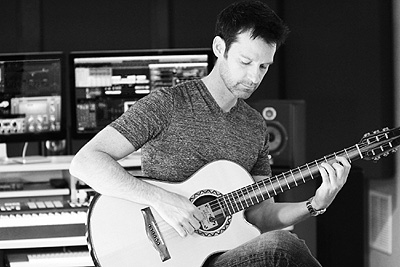 Geoff
Hall: I have nails. It’s a pain sometimes, but I do a lot
of fingerstyle and hybrid picking on both electric and acoustic guitar,
so I need them. I couldn’t ever seem to work it out with my pads
in a way that gave me a good attack, tone, dynamics, and string separation,
so I suffer through with nails! (lol)
Geoff
Hall: I have nails. It’s a pain sometimes, but I do a lot
of fingerstyle and hybrid picking on both electric and acoustic guitar,
so I need them. I couldn’t ever seem to work it out with my pads
in a way that gave me a good attack, tone, dynamics, and string separation,
so I suffer through with nails! (lol)
I do have a couple of classical guitars. I love them and don’t
get to play them enough. Ironically though, I rarely play classical
pieces on them. One is a Jim Redgate, and it’s just amazing.
I used it on "Remembering".
I’d love to play piano and want to dedicate more time to it,
but right now I use it for sketching and composing. If I’m actually
“playing” an instrument, it’s guitar. I “noodle”
on the piano/synths. Competent, but dangerous and not very good.
My time is unfortunately so limited, that I constantly feel like I’m
not practicing or composing enough. I tend to run with ideas when
they hit, and I love to play old tunes, practice scales/runs/riffs,
and learn new pieces from artists I admire as often as I can. Fortunately,
I crossed that 10,000 hours mark on guitar a long time ago, so I can
afford to spend more time composing and practice along the way, as
needed. But I’m not sure you can practice too much.
mwe3: How did you approach the mixing of While It Lasts?
The sound is remarkably good. Was there a different approach to
mixing your two albums and what kind of instructions did you give
to David Glasser on the While It Last mixing sessions and do
you know what kind of speakers did David listened to during the mix?
What other info can you provide about the various steps needed to
get the sparkling sound quality on the While It Lasts album?
Geoff Hall: I appreciate that. Thank you. It always seems like
it’s a process - and sometimes a struggle - to get the sound
you want. Early on, I made the decision to mix the project myself.
Going into it that way was helpful because I was constantly thinking
about instruments, levels, and placement. I played and recorded the
guitar in my home studio. David and I reviewed the raw guitar recordings,
made some joint EQ decisions, which were small moves in every case,
and then I mixed each piece. After that I handed the mixes to David
for mastering, and he did a terrific job, as always. He’s so
accomplished and has so much experience across a huge body of work
that it’s easy to trust his choices and let him run with what
he hears. He’s got great ears, and he’s responsive to ideas/requests
despite all of that experience. He’ll let himself be pushed in
a direction he might not have chosen, but he’ll let you know
if you’re straying into dangerous territory. His contribution
to the final outcome is tremendous.
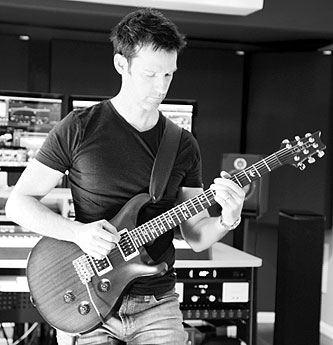 On
the gear side, I record with Neumann mics and Burl preamps. I use
a Symphony I/O and run straight into Logic Pro. I can’t speak
to all of the gear David employs, but I think the recording setup
really helped drive the results he was able to achieve in mastering.
My room isn’t completely ‘flat.’ There’s a little
bit of character or liveliness, and I get a good EQ curve for a single
room studio setup.
On
the gear side, I record with Neumann mics and Burl preamps. I use
a Symphony I/O and run straight into Logic Pro. I can’t speak
to all of the gear David employs, but I think the recording setup
really helped drive the results he was able to achieve in mastering.
My room isn’t completely ‘flat.’ There’s a little
bit of character or liveliness, and I get a good EQ curve for a single
room studio setup.
mwe3: Is your taste in music still eclectic? There aren’t
many recording artists who have influences from both the instrumental
Americana guitar genres like Will Ackerman and Alex de Grassi and
rock guitarists like Trevor Rabin as well as film score maestros like
Hans Zimmer, Howard Shore and other soundtrack composers. Is the vastness
of these different genres, and the challenge to merge them, something
that keeps you on your toes musically? Your string arrangements on
While It Lasts are brilliant as well. The guitar never had
it so good!
Geoff Hall: Right, so maybe I’ve got a multiple musical
personality disorder. (lol) I know it sounds strange. The evolution
from electric guitar, rock, prog rock, etc., to solo fingerstyle guitar
to film score and orchestral work hasn’t been a straight line.
All I can say is that it felt natural to me. The guitar is a great
instrument. For me, it was that or piano. After I became aware of
the power of the orchestra and film scores, they became part of my
musical journey. It’s true that there were many times while I
worked on the recordings and arrangements for While It Lasts, I
was itching to pull up my orchestral template and write some new pieces.
I even had a few instances where I went to the piano, developed a
theme, wrote it down, put it away, picked up the guitar, and sat down
in front of the mics again. I think I enjoy the ability to move from
one to the next and to combine them when/where appropriate. And, as
I’ve said, somehow I’ve put myself on track to record/release
some electric pieces later this year - further delaying any orchestral
or hybrid work for now. I think what happened was that I came up with
a piece or two on the electric earlier this year that I was very excited
about, and I mentally committed to getting them out there. I need
more time in the day.
mwe3: Does making a film soundtrack still intrigue you? Is
there a way to combine the string sound of Understanding The Signs
with the guitar sound, perhaps on both acoustic and electric, on While
It Lasts with your natural inclination to score and record a soundtrack
in the future? But all your string sounds are sampled am I right?
The string samples will eventually put orchestras out of business.
Geoff Hall: Yes, I would like to score films. That’s another
conversation for another day because it would be a long one. Scoring
for film is an incredibly hard space to get into - especially if you
don’t live in Los Angeles. It’s overwhelmingly discouraging
for a lot of composers - and by “composers,” I mean the
thousands of people who have the skill set to be successful at it
as opposed to the tens of thousands who might not.
The sample technology continues to get better every year. Most people
can’t honestly tell at this point if it’s one or the other.
Almost all TV is done with sample technology, and a decent percentage
of films are as well. That said, it’s no one’s goal to put
orchestras out of business. Every good composer out there likely wants
to be able to take mockups to a live orchestral recording session.
I think a lot of folks understand how important the live players are
and how valuable they are in the creation of music. When a budget
allows for it, that’s what happens. When it doesn’t, the
sample route is the only option. Good composers will always advocate
for the use of live orchestras. Seeing them disappear would be unimaginable,
and I don’t think anyone wants that.... even the developers.
 mwe3:
Are you making plans for 2020 yet? I wish you much good luck with
While It Lasts.
mwe3:
Are you making plans for 2020 yet? I wish you much good luck with
While It Lasts.
Geoff Hall: Thank you, Robert. I appreciate what you do
and your support of the release. Hopefully, the electric guitar EP
will hit before the holidays, and then who knows...



